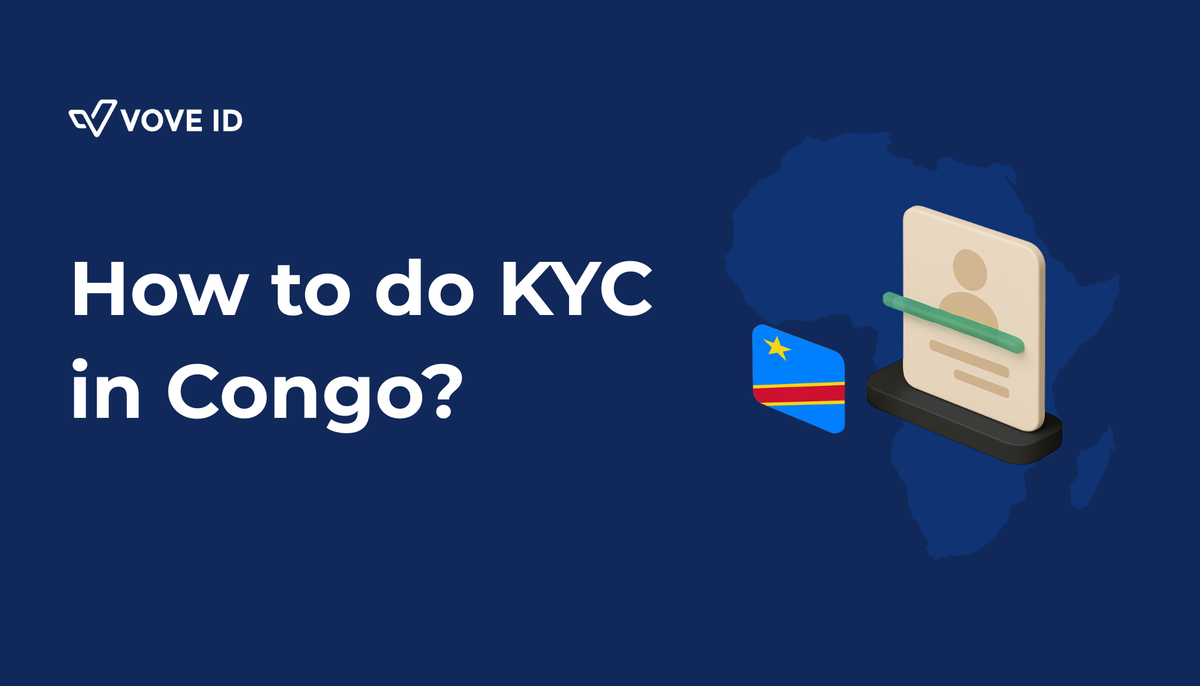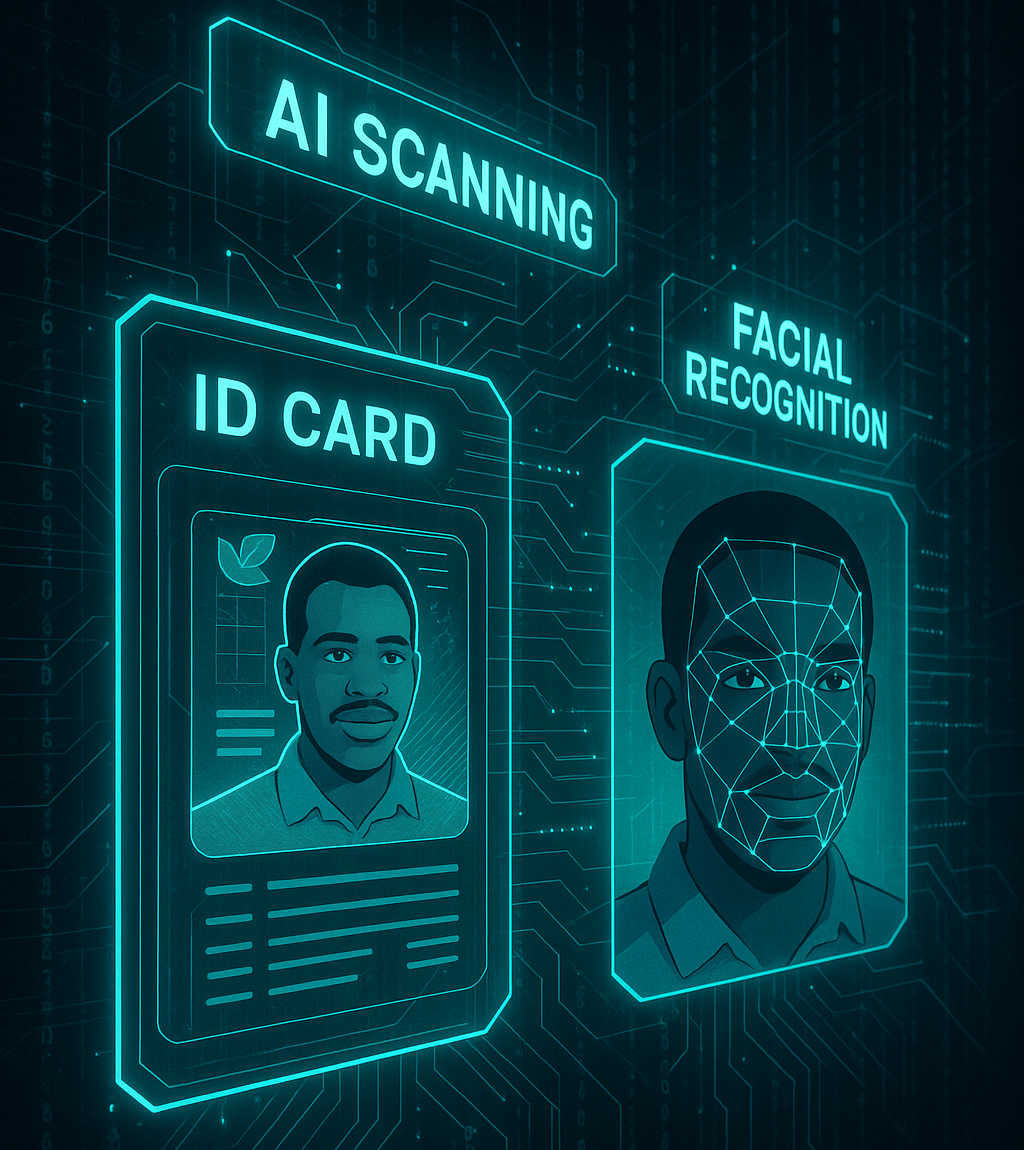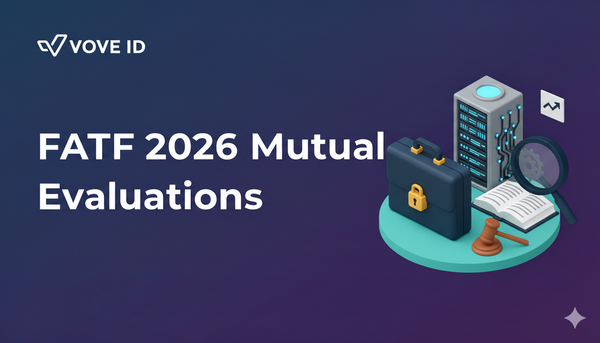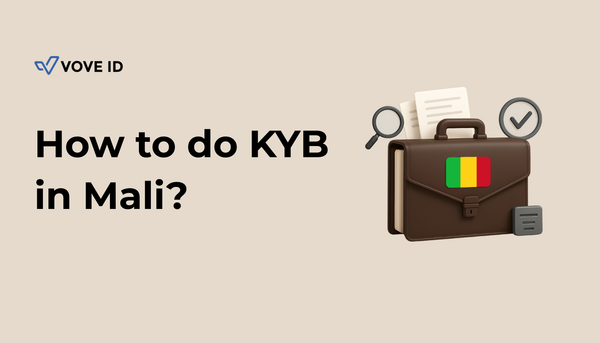KYC Compliance in the DRC: 2025 Guide for Regulated Businesses
Discover KYC regulations in the Democratic Republic of Congo (DRC) for 2025. Learn about BCC, CENAREF, FATF compliance, and how VOVE ID streamlines digital onboarding for fintechs.

Introduction: Why KYC Matters in the DRC
The Democratic Republic of Congo (DRC) is a dynamic frontier for fintechs and startups, fueled by a 47% mobile penetration rate (GSMA, 2024) and growing digital financial inclusion. With over 90% of transactions cash-based, mobile money platforms like M-Pesa and Airtel Money are driving transformation. However, this growth demands robust Know Your Customer (KYC) and Anti-Money Laundering (AML) compliance to combat financial crime, align with Financial Action Task Force (FATF) standards, and build trust in a complex market.
VOVE ID, an AI-powered digital identity verification platform, supports businesses operating in the DRC with secure, compliant, and inclusive eKYC solutions.
For fintechs, digital wallets, and lending platforms, mastering KYC in the DRC ensures regulatory compliance and unlocks growth. This guide covers the DRC’s KYC framework, core requirements, digital identity challenges, and solutions like VOVE ID for secure onboarding in 2025.
Explore eKYC trends in West Africa:
📌 KYC Compliance in Côte d'Ivoire: 2025 Guide for Regulated Businesses
📌 KYC Compliance in Ghana 2025: Guide for Fintechs and Regulated Businesses
📌 KYC Compliance in Tanzania: 2025 Overview
Regulatory Landscape: Who Governs KYC in the DRC?
The DRC’s KYC ecosystem is shaped by national and regional regulations, with reforms addressing FATF’s 2021 mutual evaluation deficiencies. Key players include:
- Banque Centrale du Congo (BCC): The central bank sets KYC and AML/CFT rules for banks, microfinance institutions, and mobile money providers via BCC Instruction No. 15.
- CENAREF (Cellule Nationale de Renseignements Financiers): The Financial Intelligence Unit (FIU) collects and analyzes suspicious transaction reports (STRs) to combat money laundering and terrorist financing.
- GABAC & FATF: As a member of the Groupe d’Action contre le Blanchiment d’Argent en Afrique Centrale (GABAC), the DRC aligns with FATF’s 40 Recommendations. The 2021 evaluation noted gaps in customer due diligence (CDD) and terrorist financing controls, with a reform plan targeting compliance by 2026.
- Key Legal Documents:
- Law No. 04/016 (2004): Governs AML and counter-terrorist financing, mandating KYC for financial institutions.
- BCC Instruction No. 15 (2018): Details customer identification, risk-based due diligence, and record-keeping.
- Law No. 17/001 (2017): Enforces data protection for KYC-related personal data.
These regulations apply to banks, fintechs, mobile money operators, and digital platforms under FATF scrutiny.
FATF Reform Timeline
- 2021: FATF mutual evaluation identifies deficiencies in CDD and terrorist financing controls.
- 2023–2025: National reform roadmap strengthens AML/CFT frameworks, focusing on KYC and STR reporting.
- 2026 (Projected): Full compliance with FATF’s 40 Recommendations, enhancing global credibility.
Core KYC/AML Requirements for Businesses
Financial institutions and fintechs must meet stringent KYC/AML requirements:
1. Identify and Verify the Customer
- Collect official identity documents: national ID card, passport, driver’s license, or regional IDs (e.g., voter cards).
- Validate authenticity using security feature detection and screen against watchlists (e.g., UN, OFAC sanctions lists).
- Verify details like full name, date of birth, and address.
2. Determine the Beneficial Owner
- Identify natural persons with significant ownership or control for corporate clients.
- Retain ownership data for 10 years post-relationship, per Law No. 04/016.
3. Apply a Risk-Based Approach
- Conduct Enhanced Due Diligence (EDD) for high-risk profiles, such as Politically Exposed Persons (PEPs) or clients from FATF grey-listed countries.
- Monitor transactions above USD 2,500 (approximately CDF 7M in 2025) for suspicious patterns.
4. Report to CENAREF
- Submit STRs within 24 hours of detecting suspicious activity.
- Report transactions above CDF 5 million (approximately USD 2,000) for scrutiny, per BCC guidelines.
For example, a fintech onboarding a Kinshasa retailer must verify their ID, screen for PEP status, and monitor transactions exceeding CDF 5M for potential money laundering risks.
Digital Identity Challenges in the DRC
The DRC faces unique hurdles for digital onboarding in the DRC:
- Low ID Penetration: Over 60% of the population lacks official IDs, with only 10% holding national ID cards (Smile ID, 2023).
- Biometric Delays: The National Identification and Registration Office (ONIP) is rolling out biometric IDs, but coverage is limited to urban areas like Kinshasa and Lubumbashi.
- Cash Dominance: 90% of transactions are cash-based, increasing money laundering risks and slowing eKYC adoption (GSMA, 2024).
- Connectivity Gaps: Only 22% of the population has reliable internet, with rural areas heavily underserved.
Fintechs need eKYC tools that work in low-documentation, low-connectivity environments while meeting BCC and CENAREF standards.
Digital KYC Trends in the DRC
Despite challenges, digital KYC is gaining momentum:
- Mobile-First Onboarding: With 47% mobile penetration, platforms prioritize smartphone-based KYC, using selfie verification and OCR for ID scanning.
- Biometric Verification: Facial recognition and liveness checks combat fraud, even with limited ID coverage.
- AI-Powered Risk Scoring: AI flags high-risk profiles and detects document forgery, boosting compliance efficiency.
- Hybrid Solutions: Fintechs combine digital verification with agent-assisted checks to reach unbanked populations in rural areas.

eKYC can increase onboarding conversion rates by up to 30%, critical for scaling in the DRC’s fragmented market.
KYC in Action: Onboarding a Mobile Money User
Consider a fintech onboarding a small-scale trader in Goma for a mobile money wallet:
- ID Verification: Collect a national ID or voter card, using OCR to validate authenticity.
- Risk Assessment: Screen for PEP status or sanctions list matches, applying EDD for cross-border traders (e.g., Rwanda).
- Transaction Monitoring: Flag transactions above CDF 5M for STR submission to CENAREF.
- Data Retention: Store data securely for 10 years, compliant with Law No. 17/001.
Hybrid KYC (e.g., agent-assisted verification) ensures inclusivity in low-documentation areas.
How VOVE ID Supports KYC Compliance in the DRC
VOVE ID offers a tailored eKYC solution for fintechs, digital wallets, and lending platforms in the DRC’s challenging market. Key features include:
- Real-Time Screening: Checks against global sanctions, PEP lists, and adverse media in seconds.
- Automated Document Verification: Validates Congolese and foreign IDs using OCR and security feature detection, ideal for low-documentation environments.
- Customizable Risk Profiles: Supports EDD workflows with AI-driven risk scoring for high-risk clients.
- French-Localized Onboarding: Mobile-first platform optimized for French-speaking users and 47% mobile penetration.
- Audit-Ready Trails: Generates compliant logs for BCC and CENAREF inspections.
VOVE ID empowers fintechs to onboard users in Kinshasa or rural areas while meeting FATF, BCC, and CENAREF standards. Request a demo here.
The DRC’s cash-heavy economy, with 90% of transactions offline, heightens money laundering risks. VOVE ID’s eKYC tools help fintechs onboard the 60% unbanked population securely, supporting financial inclusion.
Quick Stats: KYC in the DRC (2025)
- 📱 47% mobile penetration (GSMA)
- 💵 90% cash-based transactions
- 🆔 60% lack official IDs (Smile ID)
- 🏦 60% unbanked population
Frequently Asked Questions
❓ What documents are used for KYC in the DRC?
National ID cards, passports, driver’s licenses, or regional IDs (e.g., voter cards).
❓ Is eKYC mandatory in the DRC?
No, but BCC and international donors encourage it to meet FATF reform goals.
❓ Who enforces AML compliance in the DRC?
BCC oversees financial institutions; CENAREF handles STRs and intelligence.
❓ What are the penalties for non-compliance?
Fines up to CDF 50M, license suspension, or legal action, based on severity.
Mastering KYC for Growth in the DRC
KYC compliance in the DRC is a strategic necessity in a cash-heavy, rapidly evolving market. With FATF monitoring and digital transformation gaining traction, fintechs and startups must prioritize customer due diligence in the DRC to meet BCC, CENAREF, and global standards. VOVE ID’s eKYC tools—offering biometric verification, AI risk scoring, and French-localized onboarding—enable secure, inclusive growth. Start streamlining your KYC process at VOVE ID.




